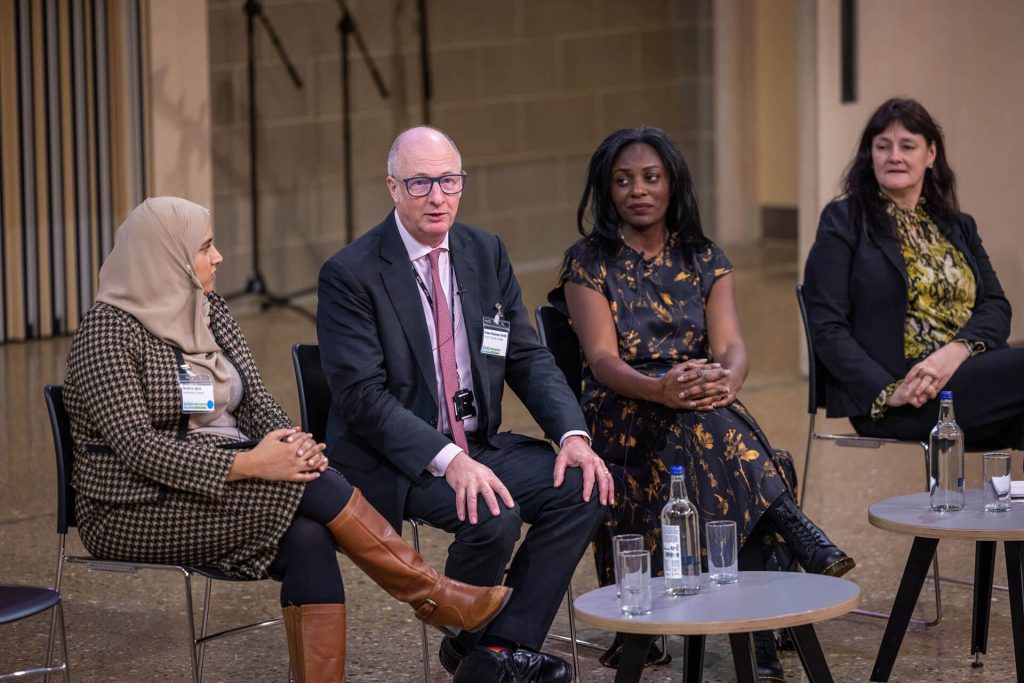How can education provide the workforce and businesses with essential skills?
Panellists: Paul Kirkbright, BIG South London; Peter Mayhew-Smith, South Thames College; Professor Helen Laville, Kingston University; Bushra Iqbal, Southwark College and Lorissa Page, NHS South West London
Education and business leaders discussed approaches for equipping students and future employees with essential employment skills at the BIG South London Business Innovation & Growth Summit 2022.
Education and business leaders discussed approaches for equipping students and future employees with essential employment skills at the BIG South London Business Innovation & Growth Summit 2022.
The ‘Delivering Essential Skills for Tomorrow’s Workforce’ session heard about challenges and solutions around issues including recruitment, retention and skills gaps.
Peter Mayhew-Smith, group CEO, South Thames College, spoke about some of the “struggles” businesses were facing with recruiting appropriately-skilled people, and that there was a “lack of engagement” and a need to “promote the fabulous range of opportunities” so these positions could be filled.
He added: “An organisation like ours fits those gaps, bridges those empty chasms in the economy and gets people into the jobs. The opportunities are rife in South West London, and we simply cannot feed the appetite right now. It is our job to encourage engagement to support people into critical sectors like health and social care, and we make sure our qualifications and training are fit for purpose.
“That also means extending our services to businesses better and better,” he added. “And making sure we’ve got the right antenna in the right way of hearing the needs of employers and shaping our curriculum to meet those needs.”
Professor Helen Laville, provost, Kingston University, said the university had worked with industry partners and businesses to create a list of skills they required.
She said: “We shifted our focus a little bit to teach things around problem solving, critical thinking, education, digital skills and analytical skills. These are the sorts of things that employers have told us they wanted.”
Work was also being done around the “language of qualifications” to help employers understand, for example, what skillset a 2:1 degree might offer.
A major challenge facing students is the “declining half-life of skills,” Prof Laville said. “Our definition of skills for the future is already out of date. And we need to remember that it’s not just us telling younger people about skills, they can tell us about the skills they predict we’ll need.”
She added that in the health sector “the problem is actually not recruiting new people but trying to get them to stay there for longer than two years”.
Lorissa Page, NHS South West London, agreed, saying: “We’re having to think more innovatively and creatively about how we retain the workforce and offer work in a way that they want to do it, being more flexible.”
She added that her organisation was “repackaging job descriptions” so that job adverts were written for people “in a way that speaks to their transferable skills”.
Bushra Iqbal, assistant principal, Southwark College, said the college took an “open house” approach involving “absolutely everybody” from the council to job centres, from businesses to residents.
She told delegates: “The skillset of two or three years ago has completely changed, so we keep asking employers, ‘what are the skills you need?’ because it can change on a weekly basis, and then we adapt, and change our curriculum.”
The new, high-level, technical-based qualification, T Levels, is providing new skills opportunities, she said, adding: “We do need a whole education approach because the first time we focus on skills shouldn’t be when students are coming to us.”
Peter Mayhew-Smith agreed, saying: “The secondary school curriculum is too narrow in years 7 to 11. They’re not getting the breadth of experience for skills in the workplace. I think that’s where some of the issues are coming through. It would be much better to integrate careers, education and guidance between schools, colleges and universities to promote a specific approach.”



